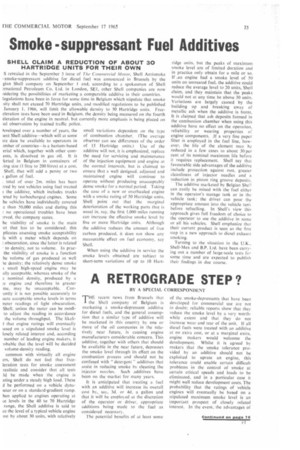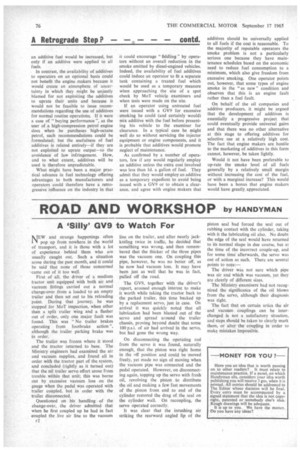A RETROGRADE STEP?
Page 75

Page 76

If you've noticed an error in this article please click here to report it so we can fix it.
BY A SPECIAL CORRESPONDENT
THE recent news from Brussels that the Shell company of Belgium is marketing a smoke-depressant additive for diesel fuels, and the general assumption that a similar type of additive will be marketed in this country by one or more of the oil companies in the relatively near future, is causing engine manufacturers considerable concern. This additive, together with others that should be available in the near future, depresses the smoke level through its effect out the combustion process and should not be confused with " detergent " additives that assist in reducing smoke by cleaning the injector nozzles. Such additives have been on the market for many years.
It is anticipated that treating a fuel with an additive will increase its overall cost by, say, 3d, or 4d, a gallon and that it will be emplo).ed at the discretion of the operator or driver, appropriate additions being made to the fuel as considered necessary.
The potential benefits of at least some
of the smoke-depressants that have been developed for commercial use are not in doubt: reliable reports show that they reduce the smoke level by a very worthwhile extent and that they do not increase wear and tear of the unit. If all diesel fuels were treated with an additive at no extra cost, or at a marginal extra, engine makers would welcome the development. Whilst it is agreed by makers that the smoke tolerance provided by an additive should not be exploited to uprate an engine, this tolerance could enable certain difficult problems in the control of smoke at certain critical speeds and loads to be eliminated, and in a particular case it might well reduce development costs. The probability that the ratings of vehicle engines will eventually be based on a stipulated maximum smoke level is an important prospect of closely related interest. In the event, the advantages of
an additive fuel would be increased, but only if an additive were applied to all fuels.
In contrast, the availability of additives to operators on an optional basis could not benefit the engine makers because it would create an atmosphere of uncertainty in which they might be unjustly blamed for not exploiting the additives to uprate their units and because it would not be feasible to issue recommendations regarding the use of additives for normal routine operations. If it were a case of "buying performance ", as the user of a high-compression petrol engine does when he purchases high-octane petrol, such recommendations could be formulated; but the usefulness of fuel additives is related entirely—if they are not exploited to uprate output—to the avoidance of law infringement. How, and to what extent, additives will be used is therefore unpredictable.
What might have been a major practical advance in fuel technology offering advantages to both manufacturers and operators could therefore have a retrogressive influence on the industry in that
it could encourage " fiddling" by operators without an overall reduction in the smoke emitted by diesel-engined vehicles. Indeed, the availability of fuel additives could induce an operator to fit a separate tank containing a treated fuel which would be used as a temporary measure when approaching the site of a spot check by MoT vehicle examiners and when tests were made on the site.
If an operator using untreated fuel were issued with a GV9 for excessive smoking he could (and certainly would) mix additive with the fuel before presenting his vehicle to the examiner for clearance. In a typical case he might well do so without servicing the injector equipment or engine components, and it is probable that additives would promote neglect of maintenance.
As confirmed by a number of operators, few if any would regularly employ an additive unless the extra cost involved was less than Id. a gallon of fuel. They admit that they would employ an additive as a temporary expedient to avoid being issued with a GV9 or to obtain a clearance, and agree with engine makers that
additives should be universally applied to all fuels if the cost is reasonable. To the majority of reputable operators the smoke problem is not a particularly serious one because they have maintenance schedules based on the economic need to reduce fuel consumption to a minimum, which also give freedom from excessive smoking. One operator points out, however, that some types of engine smoke in the "as new" condition and observes that this is an engine fault rather than a fuel fault.
On behalf of the oil companies and additive producers, it might be argued that the development of additives is essentially a progressive project that could eventually provide universal gains and that there was no other alternative at this stage to offering additives for selective use at a relatively high cost. The fact that engine makers are hostile to the marketing of additives in this form cannot, however, be taken lightly.
Would it not have been preferable to up-rate the smoke level of all fuels generally by a relatively small margin without increasing the cost of the fuel, or with a marginal increase? This would have been a bonus that engine makers would have greatly. appreciated.




















































































































































































